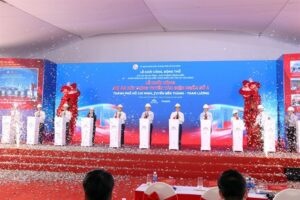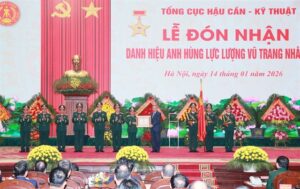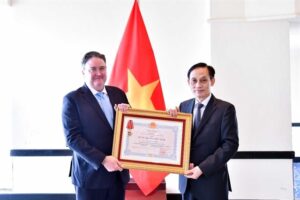Vietnam Proposes Strategic Priorities to Strengthen ASEAN Centrality Amid Global Uncertainty

Kuala Lumpur, The Gulf Observer: Vietnam’s Deputy Prime Minister and Minister of Foreign Affairs Bùi Thanh Sơn has outlined three strategic priorities to reinforce ASEAN’s central role and resilience in the face of rising regional and global challenges. The proposals were delivered during the plenary session of the 58th ASEAN Foreign Ministers’ Meeting (AMM-58), held in Kuala Lumpur on Wednesday.
Speaking before his counterparts, Minister Sơn emphasized the need for ASEAN to remain united and proactive in shaping its future trajectory. He proposed:
- Accelerating economic growth to position ASEAN as the world’s fourth-largest economy by 2030;
- Building a leading digital community with inclusive innovation ecosystems; and
- Deepening people-to-people connectivity to foster an action-oriented and inclusive ASEAN.
These priorities, Sơn noted, are grounded in ASEAN’s founding values of unity, mutual respect, and cooperation. He stressed that in today’s unpredictable global landscape, ASEAN’s centrality, cohesiveness, and commitment to sustainable development must continue to guide its actions.
The AMM-58 plenary focused on advancing the implementation of decisions made at the 46th ASEAN Summit and reviewed progress toward the ASEAN Community Vision 2045. Foreign ministers reaffirmed ASEAN’s role as a platform for strategic dialogue and regional cooperation, while urging all sectoral bodies to translate high-level directives into concrete and actionable results.
Ministers placed special emphasis on enhancing intra-regional trade, facilitating investment, and expanding physical and digital infrastructure connectivity. Discussions also covered diversifying external partnerships and building resilience against climate change, natural disasters, and other emerging risks.
In presenting Vietnam’s strategic directions, Minister Sơn elaborated on the country’s vision:
- First, ASEAN must advance deep economic integration and implement the upgraded ASEAN Trade in Goods Agreement (ATIGA), fully leverage existing free trade agreements, and expand inter-regional ties through platforms such as the Regional Comprehensive Economic Partnership (RCEP). E-commerce and digital trade should also be harnessed to unlock internal trade potential and access new markets.
- Second, ASEAN should swiftly negotiate a Digital Economy Framework Agreement tailored to real-world business needs, particularly those of micro, small, and medium-sized enterprises (MSMEs). New growth drivers — such as digital transformation, innovation, and the green economy — must be embedded within ASEAN’s external cooperation frameworks. As Chair of the ASEAN Initiative for ASEAN Integration (IAI) Task Force, Vietnam will play a key role in implementing the next IAI Work Plan.
- Third, ASEAN must bring its initiatives closer to its people through effective communication and tangible actions. Minister Sơn called for broader dissemination of ASEAN’s achievements through relatable, human-centered narratives. He added that Vietnam is currently developing a national implementation plan for ASEAN’s strategic documents toward 2045, aimed at engaging citizens, businesses, and local communities.
On regional expansion, Minister Sơn reaffirmed Vietnam’s support for Timor-Leste’s accession to ASEAN, pledging assistance in meeting membership criteria and legal commitments. He urged ASEAN to develop a roadmap to support Timor-Leste’s effective integration and ensure its smooth transition into full membership.
Earlier, in his opening address to the AMM-58, Malaysian Prime Minister Anwar Ibrahim stressed the imperative for ASEAN to remain united, strategically autonomous, and forward-looking amid growing geopolitical and economic turbulence.
He cautioned against the use of economic tools for geopolitical rivalry and called on ASEAN to act with strategic clarity and collective purpose. “ASEAN must determine its own path, grounded in purpose, vision, and ambition,” the Prime Minister said.
Prime Minister Anwar further highlighted key cooperation areas essential for regional development, including connectivity, digital transformation, food security, education, healthcare, and climate resilience. He expressed optimism about Timor-Leste’s eventual accession to ASEAN, urging all member states to support its integration into the regional community.
The AMM-58 plenary marked another important milestone in ASEAN’s ongoing journey toward a stronger, more resilient, and people-centered regional community.


